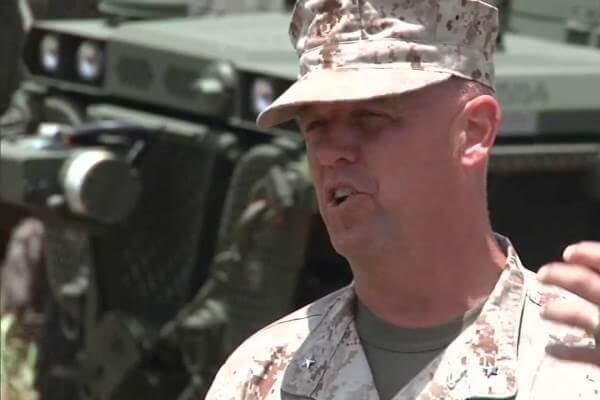Marine Corps Brig. Gen. Kevin Killea, then commander of the Marine Corps Warfighting Lab, in July 2014 speaks about the Advanced Warfighting Experiment in Hawaii. (Marine Corps photo)
A U.S. commander’s praise Friday for the Syrian Kurdish group fighting ISIS widened a growing rift with Turkey on the use of the Air Force base at Incirlik in the anti-ISIS campaign.
“The YPG (People’s Protection Units) for the coalition against ISIL (another acronym for ISIS) has been a very credible and reliable partner,” Marine Brig Gen. Kevin Killea.
U.S. airstrikes have enabled YPG ground units, backed by Syrian Arab and Christian fighters, to inflict several defeats on ISIS at Kobane, Tal Abyad and elsewhere, and the support was expected to continue, said Killea, chief of staff for Combined Joint Task Force-Operation Inherent Resolve.
Turkey’s announcement last week that the U.S. could use the airbase at Incirlik, about 70 miles from the Syrian border, for airstrikes against ISIS was seen as a potential “game changer” by American officials, but Turkey has since sought to put conditions on sorties out of Incirlik.
The airbase “can be used at any moment when considered necessary” by coalition jets, but “support for the YPG is not one of the elements of the agreement,” Tanju Bilgic, a spokesman for the Turkish foreign ministry, said Thursday.
Turkey and the U.S. also have disagreed on the status of territory retaken from ISIS along the Turkish-Syrian border. Turkey has called for the creation of a no-fly zone in the area to allow for the return of Syrian refugees, while the U.S. has backed a so-called “safe zone” cleared of ISIS.
In a video briefing to the Pentagon from the region, Killea said the disagreements with Turkey on Incirlik and other matters were being worked out. “Right now we are in dialogue and in discussions with the government of Turkey,” Killea said. If a deal can be arranged, “we think that is going to have a very positive impact in the fight against ISIL,” Killea said.
Last week, Turkey launched its first airstrikes against ISIS but Kurdish groups have charged that Turkey was using the airstrikes and the Incirlik issue as cover to resume attacks against the PKK (Kurdish Workers Party) in northwestern Iraq.
The Turkish daily Hurriyet, citing intelligence sources, said that Turkish Air Force F-16s have attacked PKK positions in waves of 30 and 40 jets. The airstrikes began on July 24 and continued on July 26 and July 28. Turkey has also aimed cross-border artillery fire at the PKK, the newspaper said.
On other issues, Killea said he could not speak to the reported capture of a Syrian moderate leader by the Al Nusra Front radical Islamist group in Syria but he denied that Syrian fighters trained by the U.S. had also been abducted.
Reports of the capture of Col. Nadim al-Hassan “had nothing to do with the new Syrian fighters who were trained and equipped,” Killea said. “We’ve had zero indication or information that there are any captured New Syrian Forces that we’ve trained.”
In Iraq, Killea said that the Iraqi Security Forces continued “shaping operations” for an eventual push to retake the Anbar provincial capital of Ramadi from ISIS. Killea declined to give a timeline for the beginning of the assault but said the coming battle “promises to test the mettle of the ISF.”
--Richard Sisk can be reached at Richard.Sisk@military.com




























